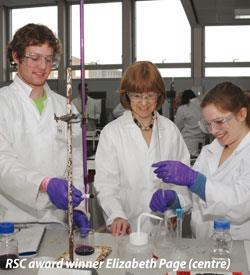Elizabeth Page, University of Reading, is the recipient of the 2010 Royal Society of Chemistry (RSC) Education Award for 'her unstinting work in the promotion of chemistry to the wider community and her commitment in supporting chemistry teachers'.

The award, now in its second year, was established by the RSC to recognise continuing high-level contribution to education in the chemical sciences. Page will receive £2000, a medal and a certificate at the RSC's general assembly in November.
Chemistry, for chemistry's sake...
Page remembers being inspired by the challenge of chemistry at school, rather than any particular teacher as is often the case. She gained a first-class honours degree in chemistry from the University of Reading, and continued along the traditional academic pathway, doing a PhD in her chosen field of transition-metal chemistry and moving on to post-doctoral research.
After a 'career break' to bring up her young family, Page returned to Reading in 1991 to continue her post-doc research in electron diffraction on a part-time basis. During this time she decided to do a part-time PGCE with the Open University, alongside her post-doc studies, with the aim of becoming a secondary school teacher. She didn't know it then, but this decision would set her up for a career, not as a school teacher but as a university lecturer who would become committed to forging links and facilitating initiatives across the secondary-tertiary interface.
First post
At the end of her PGCE, in 1997, Page was offered a part-time position in the department of chemistry at Reading as a teacher fellow. This was a new post in the department, introduced to support the increasing numbers of students entering the department with non-traditional backgrounds in chemistry.
Having identified those students most at risk of failing at the end of the first year, Page set up a support programme which involved weekly workshops, where students could re-visit or prepare for some of the more challenging aspects of the course. Page explains, 'In a smaller, more personalised environment students start to ask questions and are not intimidated by their more competent peers. By monitoring their attendance at tutorials and in practical classes, we found there was a definite link between engagement with the programme and success in the first year exams'.
Page soon began to delve deeper into the reasons why students didn't succeed at the end of the first-year. 'Having some insight in the secondary system, I decided to look at how students were being taught chemistry in schools and what differences there were in approach between the secondary and tertiary sectors. With such information we would be better equipped to help students make the transition more successfully'.
The Chemistry Teachers' Centre
In 2000, the numbers of students taking degrees in chemistry were falling nationally. Page and her colleague Andy Russell were summoned by the then head of department, Andrew Gilbert, and asked to get together a group of chemistry teachers to find out why their students were not choosing to study chemistry in HE.
The meeting provided some answers - chemistry had a poor image in the media, it was perceived as a hard subject that had lost its magic, and few students could see the relevance of the subject to their lives. There was also a lack of clarity about the jobs available to chemists. But, as Page explains, 'the meeting provided us with much more. We quickly realised that what we needed to do was work with teachers to find out how best we could support them in enthusing their students. Critically, they told us if we wanted to turn students onto chemistry by using outreach activities they would have to support the curriculum as well as being entertaining and interesting'.
Significantly, the talks led directly to the development of a Chemistry Teachers' Centre (CTC) in the department, which to this day provides chemistry teachers with a place to get together to discuss issues relevant to their teaching and gives Page and her colleagues the opportunity to work with them on a variety of projects. 'All the outreach we now do', explains Page, 'is delivered in conjunction with the CTC'.
A big plus of the CTC for Page is the link it has given her to teachers, who have worked with her to develop and run the Undergraduate Ambassador Scheme. This initiative places undergraduates in schools as part of a final-year project, giving them some insight into teaching while they act as ambassadors for chemistry to the school students. According to Page, 'since we've been running this scheme we have seen a big increase in the numbers of our students who go on to apply for PGCE courses. This is vital because if we want to get more youngsters interested in chemistry, then we need good chemistry teachers'.
Excellence in teaching
Page's interest in the secondary-tertiary interface has seen her involved with myriad outreach activities over the past 15 years. She is currently school director of the outreach programme at Reading for chemistry, food and pharmacy. All this and she still manages to carry out the day job - she is director of undergraduate studies in chemistry and lectures to undergraduates in inorganic chemistry as well as teaching chemistry to non-chemists across the faculties of sciences and life sciences.
In 2009 Page was awarded a University Teaching Fellowship in recognition of excellence in teaching. With this came a grant to fund a three-year research project. Page is again focusing on the secondary-tertiary interface but this time on the development of transferable skills for employment through chemistry.
Making links between secondary and tertiary education is what Page does best. For her, success comes down to working with teachers to ensure they have a joined up approach, and promoting chemistry to young people, not directly but as a facilitator who sees what is needed and makes sure activities are done well.






No comments yet